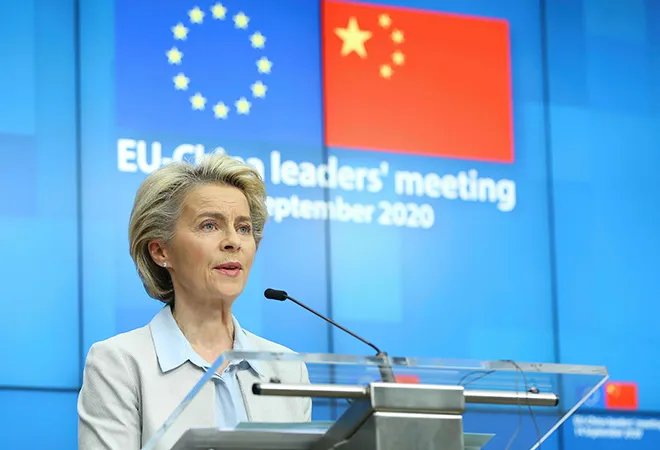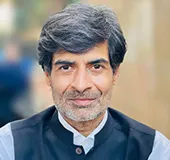
On 30 December 2020, an EU Press Release proudly declared “Leaders concluded in principle the negotiations on the EU-China Comprehensive Agreement on Investment (CAI).” The conclusion — at least of this stage of the negotiations (the agreement will still have to withstand the scrutiny of the European Parliament) — has already spawned a cottage industry of commentaries.
The great and the good, particularly from the fields of Economics and Law, are having quite a time pondering and speculating over the (rather limited) detail that is available. Academic chatter is bubbling away on a range of issues: On what the agreement could mean for issues of Level Playing Field; how the terms that the EU has secured for itself compare with the US-China Phase 1 agreement (note that even though the EU-China deal is on investment while the US-China was on trade, there are some overlaps on issues like Forced Technology Transfer); how enforceable would social and environmental clauses turn out to be that the EU is touting as a major win; and so on and so forth? But much of this punditry, while tantalisingly delicious in the technocratic safety bubble that it lives in, reminds us of Nero fiddling as Rome burns. This is not the time to be bean-counting economic gains and losses. The abyss, which the EU has been gazing so greedily into, is staring back its Medusa stare.
The abyss
There is much that is wrong with the deal, which we could point to, in both process and implications.
We could look askance upon the remarkable haste with which the European Union — normally a lumbering, complicated, and bureaucratic machine — has pushed this deal through. Or we could suggest that the Zaubertrank at work now be made the official beverage for the bureaucracy in Brussels.
We could raise an eyebrow at the fact that the final negotiations took place at what is usually expected to be the quietest time of the year: Holiday closures, understaffed newspaper offices, and tired citizens desperately trying to catch a breath or two in the period that is so sweetly described in German as “zwischen den Jahren” (the quiet time in between the years). Our raised eyebrows could perhaps rise further still if we turned our attention to the fact that people across Europe are caught in a surging second wave of the coronavirus pandemic (on the day that the deal was signed, Germany reached a new and depressing record of daily deaths due to COVID-19). And we could applaud that neither the pandemic nor the holiday despair could prevent this ‘systemic rivalry’ from being recast.
We could question not only the timing of the EU-China party, but also the choice of protagonists: In what capacity was President Macron present at this meeting? The impression that screenshots of the meeting give is that the two largest economies of Europe — Germany and France — are in the driver’s seat; all the attention that the union claims to give to representation and accountability for its remaining 25 members (to be reduced to 24 with Britain exiting on 31 December) is little more than lip-service.
We could even — if we were thus inclined — point out politely that we are not convinced by the European Commission President, Ursula von der Leyen’s, claim that the “Agreement will uphold our interests and promotes our core values. It provides us a lever to eradicate forced labour.” The clauses, at least as they are reported in the EU’s Press release, are weak. They are, in fact, so weak, that one might almost want to graffiti LOLOL (Laugh Out Loud On Labour standards) all over it, were it not for the tragic and horrendous human rights violations that are reported in Xinjiang.
We could raise all these issues, and more along such lines. But they still would not get us to the crux of a matter that is deeply political.
The abyss stares back
International trade and investment — for all the conceits that many economists and lawyers seem to have about these issues — are inherently political. And they have become even more political in the context of China’s rise: Not only because of the use and abuse of multilateral rules by non-market economies (which is what defenders of CAI tend to focus on), but also because of the fundamental difference in values that should define the goals of multilateral cooperation. Contra the inclination of technocrats to reduce values to labour and environmental standards, values include first-order principles of democracy, liberalism, pluralism, and more. And international trade and investment, especially in a world where interdependence can be weaponised, have become just too important to be left in disciplinary silos or technocratic bubbles. CAI is not “just” a matter of investment, or even standards; it is a matter that has potentially serious security implications. It begins to dramatically alter who we are as a society, community and people.
China has, perhaps, more than ever in 2020, given Europe ample evidence of these differences. It has threatened and bullied democratic Australia for having the gumption to push for an enquiry on the origins of the pandemic. Its new security law has all but abolished the promise of “one country two systems” for Hong Kong. Its adventurism in the neighbouring seas has increased. Its border conflict with India has escalated to a new level. Its increasing use of “wolf-warrior diplomacy” has even given up the pretence of sweet talk on many issues that most democracies hold dear.
Despite all these clear provocations, the EU has done little to update its strategy. It has — almost religiously — continued to repeat its mantra of 2019: It sees China as its partner, competitor, and rival. This, in fact, was nothing but fence-setting — and with the conclusion of the CAI negotiation, the EU has signalled to its own people, its allies, and indeed to China, which side of the fence it prefers.
The CAI — despite von der Leyen’s claim that it will help the EU defend multilateralism — is not multilateral at all. It is a bilateral deal with an authoritarian power that seems to have a very different understanding of multilateralism. It comes at an especially ill-opportune time. It signals to China that the EU now, not only turns a blind eye to, but actually rewards its increasingly aggressive behaviour. It suggests that the EU has scarce regard for its closest ally — the United States — which, under the incoming Biden administration, had clearly revealed that it would like to work together on China. It does not reassure other democracies — such as Australia, Japan, and India — and it also undermines the potential for alliances with like-minded players. And the deal is a slap in the face of multilateralism: It shows how, for all its talk in favour of reforming multilateralism, the EU actually attaches greater worth to a bilateral deal with a country that has contributed significantly to the breaking of the system.
In the 1990s, many were determined to embrace the “middle kingdom” and integrate it with the multilateral trading arrangement. The argument was that this would make China more like ‘us’. Tragically, many in the EU today are more like China instead. This agreement marks the move of the Union from ‘values’ to “valuations” and from ideals to trade.
Importantly, these are all choices that the EU has made. They cannot be fobbed off on China. China has simply gamed a round of Realpolitik rather effectively. Europe, in contrast, has weakened its own hand, given short shrift to its own values, and undermined the position of its friends and allies.
The views expressed above belong to the author(s). ORF research and analyses now available on Telegram! Click here to access our curated content — blogs, longforms and interviews.




 PREV
PREV



